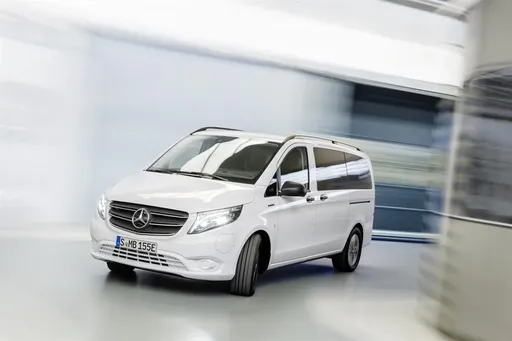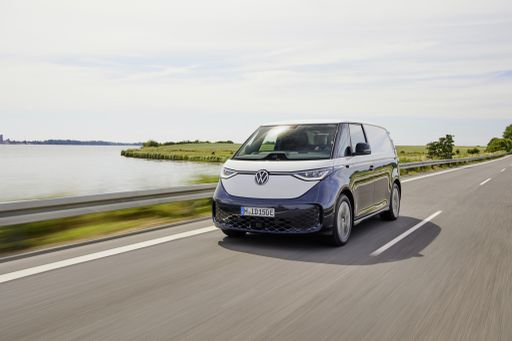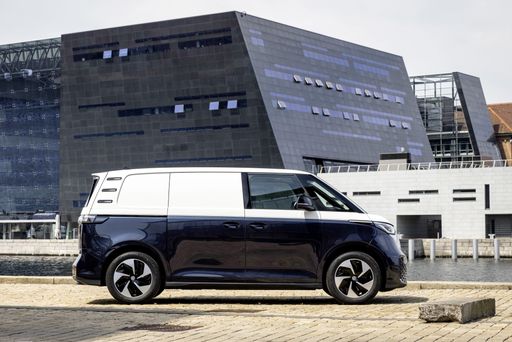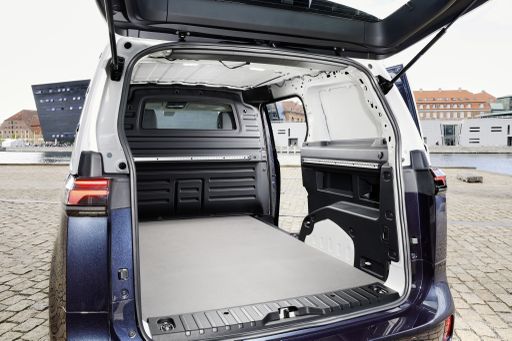Mercedes Vito Bus vs VW ID. Buzz Cargo - Differences and prices compared
Compare performance (237 HP vs 340 HP), boot space and price (36300 £ vs 43600 £ ) at a glance. Find out which car is the better choice for you – Mercedes Vito Bus or VW ID. Buzz Cargo?
Costs and Efficiency:
Price and efficiency are often the first things buyers look at. Here it becomes clear which model has the long-term edge – whether at the pump, the plug, or in purchase price.
Mercedes Vito Bus has a slightly advantage in terms of price – it starts at 36300 £ , while the VW ID. Buzz Cargo costs 43600 £ . That’s a price difference of around 7234 £.
In terms of energy consumption, the advantage goes to the VW ID. Buzz Cargo: with 19.20 kWh per 100 km, it’s clearly perceptible more efficient than the Mercedes Vito Bus with 26.70 kWh. That’s a difference of about 7.50 kWh.
As for electric range, the VW ID. Buzz Cargo performs somewhat better – achieving up to 455 km, about 85 km more than the Mercedes Vito Bus.
Engine and Performance:
Power, torque and acceleration are the classic benchmarks for car enthusiasts – and here, some clear differences start to show.
When it comes to engine power, the VW ID. Buzz Cargo has a clearly perceptible edge – offering 340 HP compared to 237 HP. That’s roughly 103 HP more horsepower.
In terms of top speed, the VW ID. Buzz Cargo performs a bit better – reaching 160 km/h, while the Mercedes Vito Bus tops out at 140 km/h. The difference is around 20 km/h.
There’s also a difference in torque: VW ID. Buzz Cargo pulls evident stronger with 679 Nm compared to 500 Nm. That’s about 179 Nm difference.
Space and Everyday Use:
Beyond pure performance, interior space and usability matter most in daily life. This is where you see which car is more practical and versatile.
Seats: Mercedes Vito Bus offers significantly more seating capacity – 8 vs 3.
In curb weight, Mercedes Vito Bus is a bit lighter – 2023 kg compared to 2264 kg. The difference is around 241 kg.
In maximum load capacity, the Mercedes Vito Bus performs distinct better – up to 4990 L, which is about 1090 L more than the VW ID. Buzz Cargo.
When it comes to payload, Mercedes Vito Bus clearly perceptible takes the win – 1077 kg compared to 753 kg. That’s a difference of about 324 kg.
Who wins the race in the data check?
The Mercedes Vito Bus is narrowly ahead in the objective data comparison.
This result only shows which model scores more points on paper – not which of the two cars feels right for you.
Costs and Consumption
View detailed analysis
Engine and Performance
View detailed analysis
Dimensions and Body
View detailed analysis

Mercedes Vito Bus
Mercedes Vito Bus
The Mercedes Vito is a sturdy, no-nonsense people carrier that blends commercial practicality with a surprisingly civilised cabin, making long shuttles feel less like a chore. If you need a dependable transporter that swallows luggage, forgives hard use and still looks a touch more premium than a plain van, the Vito is an easy, sensible pick.
details
VW ID. Buzz Cargo
The VW ID. Buzz Cargo marries retro Volkswagen charm with a thoroughly modern electric work van, offering a surprisingly spacious and practical load area wrapped in friendly, iconic styling. It's a smart pick for urban tradespeople and small businesses who want quiet, effortless driving, lower running costs and easy maneuverability — with a healthy dash of nostalgia on the job.
details


Costs and Consumption |
|
|---|---|
|
Price
36300 - 55900 £
|
Price
43600 - 51400 £
|
|
Consumption L/100km
6.7 - 10 L
|
Consumption L/100km
-
|
|
Consumption kWh/100km
26.7 - 26.9 kWh
|
Consumption kWh/100km
19.2 - 20.3 kWh
|
|
Electric Range
248 - 370 km
|
Electric Range
330 - 455 km
|
|
Battery Capacity
60 - 90 kWh
|
Battery Capacity
59 - 79 kWh
|
|
co2
0 - 228 g/km
|
co2
0 g/km
|
|
Fuel tank capacity
57 - 70 L
|
Fuel tank capacity
-
|
Dimensions and Body |
|
|---|---|
|
Body Type
Bus
|
Body Type
Cargo Van
|
|
Seats
8
|
Seats
3
|
|
Doors
4
|
Doors
4
|
|
Curb weight
2023 - 2739 kg
|
Curb weight
2264 - 2510 kg
|
|
Trunk capacity
580 - 1390 L
|
Trunk capacity
-
|
|
Length
4895 - 5370 mm
|
Length
4712 mm
|
|
Width
1928 mm
|
Width
1985 mm
|
|
Height
1890 mm
|
Height
1932 mm
|
|
Max trunk capacity
4190 - 4990 L
|
Max trunk capacity
3900 L
|
|
Payload
726 - 1077 kg
|
Payload
640 - 753 kg
|
Engine and Performance |
|
|---|---|
|
Engine Type
Diesel, Electric, Petrol
|
Engine Type
Electric
|
|
Transmission
Automatic
|
Transmission
Automatic
|
|
Transmission Detail
Automatic Gearbox, Reduction Gearbox
|
Transmission Detail
-
|
|
Drive Type
Rear-Wheel Drive, All-Wheel Drive, Front-Wheel Drive
|
Drive Type
Rear-Wheel Drive, All-Wheel Drive
|
|
Power HP
136 - 237 HP
|
Power HP
170 - 340 HP
|
|
Acceleration 0-100km/h
-
|
Acceleration 0-100km/h
-
|
|
Max Speed
140 km/h
|
Max Speed
145 - 160 km/h
|
|
Torque
330 - 500 Nm
|
Torque
310 - 679 Nm
|
|
Number of Cylinders
4
|
Number of Cylinders
-
|
|
Power kW
100 - 174 kW
|
Power kW
125 - 250 kW
|
|
Engine capacity
1950 - 1999 cm3
|
Engine capacity
-
|
General |
|
|---|---|
|
Model Year
2024
|
Model Year
2024
|
|
CO2 Efficiency Class
G, A
|
CO2 Efficiency Class
A
|
|
Brand
Mercedes-Benz
|
Brand
VW
|
What drive types are available for the Mercedes Vito Bus?
The Mercedes Vito Bus is offered with Rear-Wheel Drive, All-Wheel Drive or Front-Wheel Drive.
